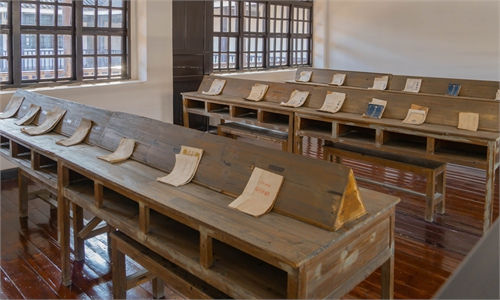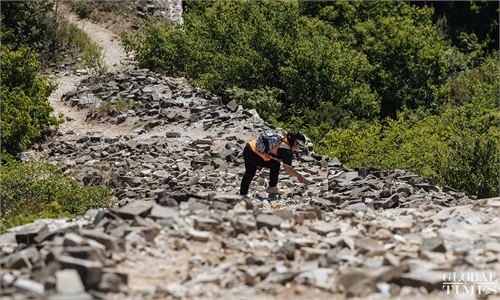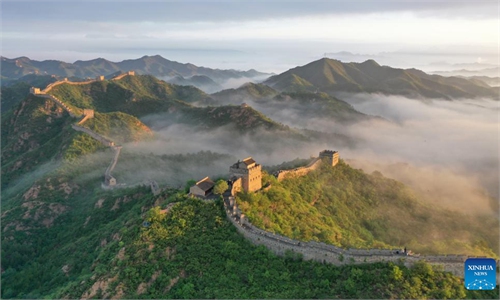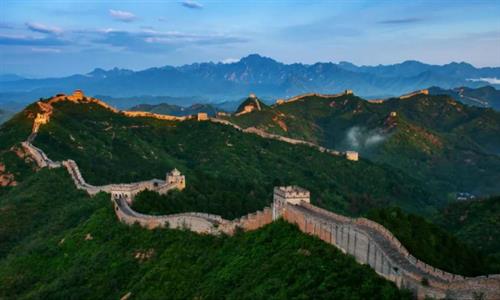ARTS / CULTURE & LEISURE
Great Wall preservation boosts rural revitalization
Guardians of heritage
The Great Wall stands as a testament to the indomitable spirit and rich cultural heritage of China, as the ancient structure not only reflects the resilience and unity of the country but also plays a pivotal role in the revitalization of rural communities along its length.
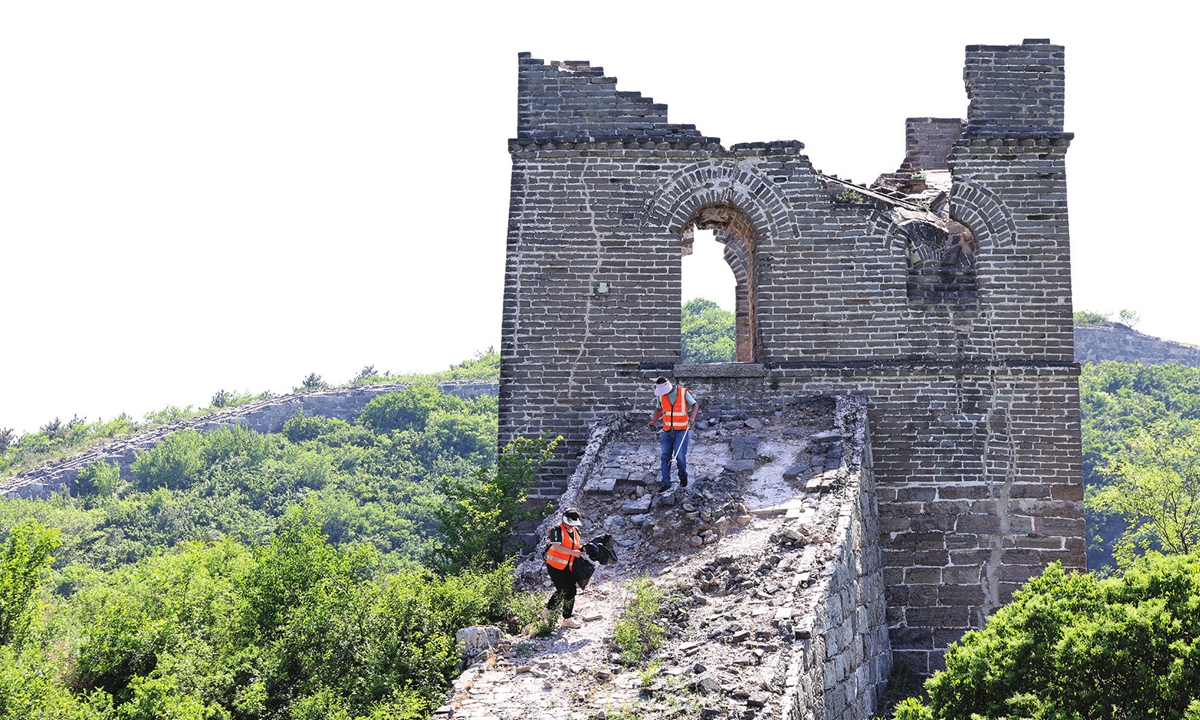
Nestled in the southwestern part of Beijing's Yanqing district, Shixia village, which was built in Ming Dynasty (1368-1644), lies at the foot of the ancient Badaling and Shixia Pass sections of the Great Wall. Both sections held strategic and military importance in ancient time.
The village, along with many untapped stone-and-brick sections that continue to thrive thanks to the local villagers' constant preservation, is home to a dedicated community of guardians committed to preserving this historical marvel.
New path for development
Leveraging the Great Wall resources, Shixia village has developed branded homestays and recreational agriculture, carving out a new path for rural cultural and tourism development.
Li Handong, Party chief of Shixia village, told the Global Times that the villagers have reaped rewards for their preservation efforts as the development of Great Wall tourism has driven local economic growth, leading to a significant increase in villagers' income.
In the past, villagers could only rely on selling corn and local specialties to earn a meager income. Now, with tourism, homestays, and catering, the village hosts over 40,000 tourists each year. The cultural resources at the Great Wall have paved the way for local villagers to lead a better life, Li Handong said.
Li Qinghua, Party chief of Badaling township, who is in charge of Shixia village at the foot of the Badaling Great Wall, told the Global Times that the local authorities decide to transform the resources of the Great Wall into concrete measures for rural revitalization.
"We plan to create a sweeping Great Wall scenic area that combines the Badaling section with the neighboring sections, improve transportation facilities and establish new climbing and riding trails," Li Qinghua told the Global Times. "Two in-depth tour routes around the village will be rolled out to allow visitors to experience the daily routines of the ancient soldiers who once patrolled the Great Wall here."
Hou Lin, deputy director of the Yanqing District Bureau of Culture and Tourism, told the Global Times that Yanqing will continue to explore the cultural resources of the Great Wall, promote and inherit the culture of the Great Wall and create unique cultural and tourism products, burnishing the reputation of the Badaling Great Wall as a world-class icon.
"We will continue to hold cultural events themed around the Great Wall, such as the ongoing Beijing Great Wall Concert and Great Wall Cultural Festival, to promote the profound history and cultural heritage of the Great Wall," said Hou.
Today, 80 percent of Shixia's residents are volunteer protectors, demonstrating a community-wide commitment to this great cause.
Their dedication has transformed the village, attracting tourists who stay in renovated guesthouses and dine on unique stone-cooked dishes, enjoying the rustic charm and rich history of the area featuring the Great Wall.
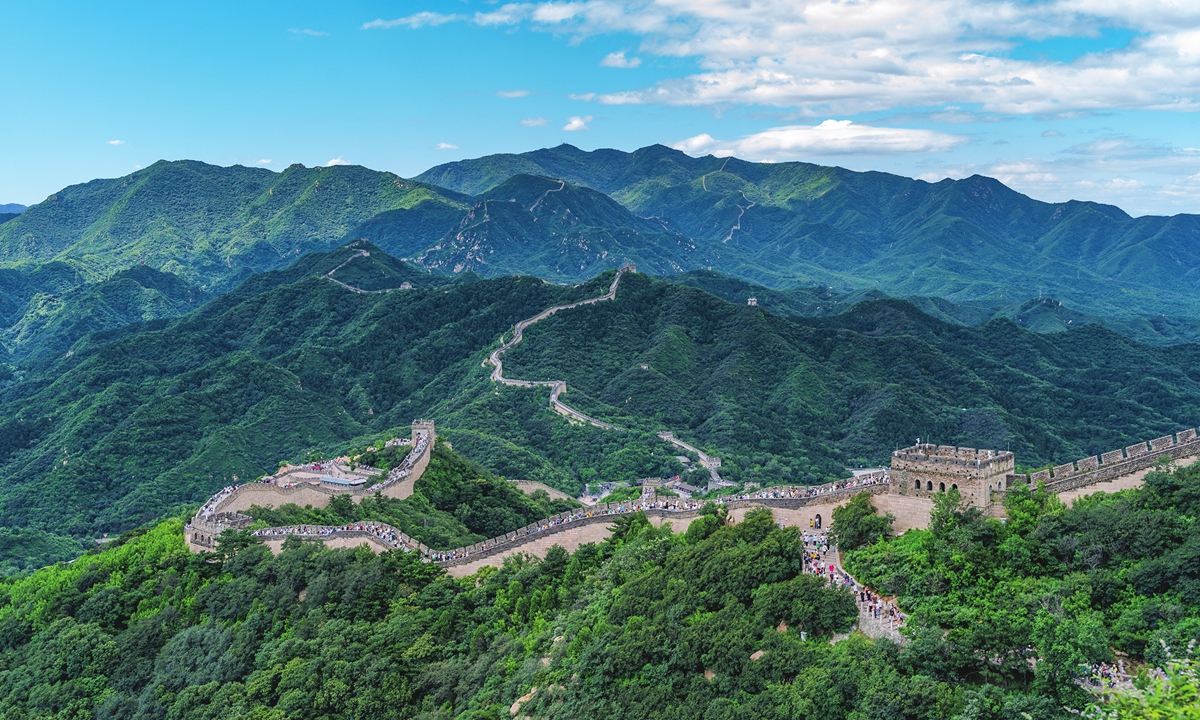
Further west, in Northwest China's Gansu Province, the village of Jiayuguan lies under the watchful gaze of the imposing Jiayuguan Fortress.
The village's history is deeply intertwined with the Great Wall, and the local saying goes, "I'm home when I see the Great Wall." This sentiment has guided generations of villagers in their custodianship of the wall.
Lin Jing, a native of Jiayuguan, grew up with the Great Wall as a constant backdrop.
His family, like many others in the village, took great pride in having protected it. After working as a head chef in South China's Guangdong Province, Lin returned to his roots.
The sight of the restored fortress, with its walls no longer crumbling, filled him with a profound sense of pride and belonging.
Upon his return, Lin decided to open the village's first agritourism business, combining his culinary skills with the hospitality learned during his years away.
His venture quickly became a hit, drawing tourists eager to experience life near the Great Wall. His establishment, which offers both dining and accommodation, has set a new standard in the village.
Since 2013, thanks to comprehensive restoration efforts on the Great Wall, Jiayuguan has seen a surge in tourism.
The village now boasts 18 agritourism businesses and 10 rural guesthouses, providing employment and significantly boosting local incomes.
In 2023, the per capita income of Jiayuguan villagers increased by over 8,000 yuan ($1,102) from 2019, reaching 28,000 yuan.
Shared commitment
The stories of Shixia and Jiayuguan villages highlight a broader trend of rural revitalization driven by the preservation of the Great Wall, as the preservation efforts have spread across the Great Wall villages from its east end to the west end.
These efforts not only protect a priceless cultural heritage but also breathe new life into rural communities, creating economic opportunities and fostering a sense of pride and purpose among residents, said Yuan Jianqin, head of the Great Wall Cultural Tourism Association in Datong, North China's Shanxi Province.
The preservation of the Great Wall, guided by the hands and hearts of dedicated villagers, ensures that this ancient marvel continues to inspire and thrive.
"The Great Wall stands not only as a monument of history but also as a beacon of prosperity for future generations," Lin said.
Wang Jintao contributed to the story.

Volunteers from Shixia village check the condition of the Great Wall. Photo: VCG
As one of the most iconic symbols of the Chinese civilization, its preservation is a collective responsibility.Nestled in the southwestern part of Beijing's Yanqing district, Shixia village, which was built in Ming Dynasty (1368-1644), lies at the foot of the ancient Badaling and Shixia Pass sections of the Great Wall. Both sections held strategic and military importance in ancient time.
The village, along with many untapped stone-and-brick sections that continue to thrive thanks to the local villagers' constant preservation, is home to a dedicated community of guardians committed to preserving this historical marvel.
New path for development
Leveraging the Great Wall resources, Shixia village has developed branded homestays and recreational agriculture, carving out a new path for rural cultural and tourism development.
Li Handong, Party chief of Shixia village, told the Global Times that the villagers have reaped rewards for their preservation efforts as the development of Great Wall tourism has driven local economic growth, leading to a significant increase in villagers' income.
In the past, villagers could only rely on selling corn and local specialties to earn a meager income. Now, with tourism, homestays, and catering, the village hosts over 40,000 tourists each year. The cultural resources at the Great Wall have paved the way for local villagers to lead a better life, Li Handong said.
Li Qinghua, Party chief of Badaling township, who is in charge of Shixia village at the foot of the Badaling Great Wall, told the Global Times that the local authorities decide to transform the resources of the Great Wall into concrete measures for rural revitalization.
"We plan to create a sweeping Great Wall scenic area that combines the Badaling section with the neighboring sections, improve transportation facilities and establish new climbing and riding trails," Li Qinghua told the Global Times. "Two in-depth tour routes around the village will be rolled out to allow visitors to experience the daily routines of the ancient soldiers who once patrolled the Great Wall here."
Hou Lin, deputy director of the Yanqing District Bureau of Culture and Tourism, told the Global Times that Yanqing will continue to explore the cultural resources of the Great Wall, promote and inherit the culture of the Great Wall and create unique cultural and tourism products, burnishing the reputation of the Badaling Great Wall as a world-class icon.
"We will continue to hold cultural events themed around the Great Wall, such as the ongoing Beijing Great Wall Concert and Great Wall Cultural Festival, to promote the profound history and cultural heritage of the Great Wall," said Hou.
Today, 80 percent of Shixia's residents are volunteer protectors, demonstrating a community-wide commitment to this great cause.
Their dedication has transformed the village, attracting tourists who stay in renovated guesthouses and dine on unique stone-cooked dishes, enjoying the rustic charm and rich history of the area featuring the Great Wall.

An aerial view of the Badaling section of the Great Wall in Beijing Photos: VCG
'The West End'Further west, in Northwest China's Gansu Province, the village of Jiayuguan lies under the watchful gaze of the imposing Jiayuguan Fortress.
The village's history is deeply intertwined with the Great Wall, and the local saying goes, "I'm home when I see the Great Wall." This sentiment has guided generations of villagers in their custodianship of the wall.
Lin Jing, a native of Jiayuguan, grew up with the Great Wall as a constant backdrop.
His family, like many others in the village, took great pride in having protected it. After working as a head chef in South China's Guangdong Province, Lin returned to his roots.
The sight of the restored fortress, with its walls no longer crumbling, filled him with a profound sense of pride and belonging.
Upon his return, Lin decided to open the village's first agritourism business, combining his culinary skills with the hospitality learned during his years away.
His venture quickly became a hit, drawing tourists eager to experience life near the Great Wall. His establishment, which offers both dining and accommodation, has set a new standard in the village.
Since 2013, thanks to comprehensive restoration efforts on the Great Wall, Jiayuguan has seen a surge in tourism.
The village now boasts 18 agritourism businesses and 10 rural guesthouses, providing employment and significantly boosting local incomes.
In 2023, the per capita income of Jiayuguan villagers increased by over 8,000 yuan ($1,102) from 2019, reaching 28,000 yuan.
Shared commitment
The stories of Shixia and Jiayuguan villages highlight a broader trend of rural revitalization driven by the preservation of the Great Wall, as the preservation efforts have spread across the Great Wall villages from its east end to the west end.
These efforts not only protect a priceless cultural heritage but also breathe new life into rural communities, creating economic opportunities and fostering a sense of pride and purpose among residents, said Yuan Jianqin, head of the Great Wall Cultural Tourism Association in Datong, North China's Shanxi Province.
The preservation of the Great Wall, guided by the hands and hearts of dedicated villagers, ensures that this ancient marvel continues to inspire and thrive.
"The Great Wall stands not only as a monument of history but also as a beacon of prosperity for future generations," Lin said.
Wang Jintao contributed to the story.
